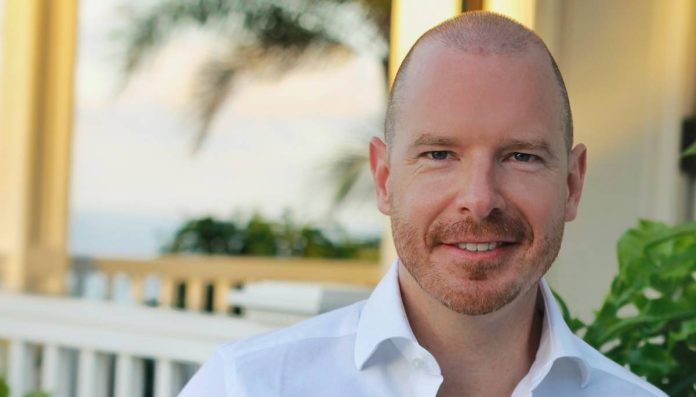Gambling.com Group’s position as a major US affiliate has been unquestioned for quite some time. The company has dominated casino-related search results for years, but in what some would call an upset Gambling.com Group walked away with the SBC Award for Sports Affiliate of the Year last month. It isn’t completely unexpected though, as the group stood out from the competition with a strong year of acquisitions like Roto Sport Group and expansion into Ontario.
Under the guidance of CEO Charles Gillespie, Gambling.com Group has successfully navigated its first year as a publicly traded company. The company could also add some trophies to the case at next month’s SBC Awards in Barcelona, where it is shortlisted in every affiliate category.
Gillespie spoke with SBC Americas about how Gambling.com Group and himself as a leader navigate through a period of busy M&A as well as how his entrepreneurial roots help to both find and nurture great acquisition targets but also fold them into the larger company in a smooth and welcoming way.
SBC: How would you describe your leadership style?
CG: I am very much an entrepreneur. I studied entrepreneurship. I started this company when I was still in university, and I’ve never had a proper job if you will. So I’m very curious about entrepreneurship. I love to help entrepreneurs and that’s kind of the prism through which I look at the world.
My leadership style is very hands-off. It’s all about finding not only the best people and partners but the ideal people and partners for every role in the organization. And I obviously personally can’t fill every single role in the organization. So, what I do is make sure that the people around me at the top are as good as it gets for whatever position that is that they occupy. Betting on really talented people and paying them properly and incentivizing them properly actually makes life very easy. Very talented, self-motivated people with the right incentives don’t need to be babysat. They’re gonna get on with it whether you’re on their back or not. And the reality is they probably will do even better if you’re not on their back.
SBC: You mentioned your love of entrepreneurship. With all the M&A going on at Gambling.com Group, does that sort of scratch your entrepreneurial itch?
CG: Absolutely. When our M&A team has an initial outreach with a target, it’s one tone of conversation. When I’m able to participate in those initial outreach calls, it’s, frankly, a very different tone. The M&A guys are great, but they’ll start asking the usual questions about finances and plans and budgets and everything else, whereas I just want to hear the story. How did this start? How did you get here? What were the zigs and zags along the way? How many near-death experiences did you have? And for me, that’s always the place to start. I think when you’re talking to other entrepreneurs that really resonates with them, and they can tell that we’ve been in the trenches we’ve had our trials and tribulations.
SBC: Finding M&A targets seems to be part art, part science. After identifying targets, how much of a conversation is there about how the people at the organization will fit into Gambling.com Group?
CG: We have a no jerks policy, to start. One bad apple will ruin the entire barrel, and we’re very conscious of that. If we’re getting serious with an acquisition target, we start assessing the people to make sure, first and foremost, there’s no bad apples.
My view on the industry is that there’s essentially an infinite amount of opportunity, but a very finite number of people that can actually execute on these opportunities. You know see this with many of the affiliate companies. You could go into 50 different markets. It’s not like people only like to gamble in Sweden, the UK, and the US. There’s kind of as much out there as you want. But the problem is you need to adequately resource every single one of these projects and you need to have competent, experienced people that ideally have done it before owning each one of these markets. That’s the bottleneck.
There are not that many of those people out there, so when we look at M&A, we’re very focused on the teams and we want to make sure that we can work with these people, and that they’re in it for more than a quick sale. Maybe there’s an earn-out, maybe there isn’t, but even if there isn’t an earn-out, what are their plans? Are they going to stick around? Do we want them to stick around? If we found a business we could buy that was interesting but had a management team we thought we couldn’t work with or trust, there’s no way we would do that deal.
SBC: Scaling is so hard with a startup and shifting to that corporate vibe. If you don’t build out properly, you can break a lot of things that work with your company. What processes do you have in place when you bring a new company into the fold to make sure that you’re keeping the essence of that company, but they are fitting in culturally?
CG: It’s an important question. If you buy a couple of different businesses, and you don’t integrate them well, why did you buy them? And there are different types of integration. There’s technical integration, there’s accounting integration. And then there’s cultural integration, and you know, even different groups within the same organization can have different cultures, right? It’s not like every single team has to be signed up to the exact same rigid interpretation of the corporate culture. But you do need some overriding values by which you can communicate to the entire organization and say, Look, this is what’s important to us. If you want to have a very successful career at Gambling.com Group we have four values, which are written down, presented to everyone, and made clear organization-wide about what’s important to us. And that’s something we’ve implemented relatively recently, although it’s something that we’ve spent years thinking about.
We have a group of people that have been working for us for nearly 10 years, and those folks have had the opportunity to work alongside myself and the co-founder Kevin [McCrystle], so they already know what’s important to us. We didn’t need to put it on paper for them. But for the folks that have joined since the start of the year and probably haven’t met me in person, they don’t have that experience and they shouldn’t have to guess. It sounds incredibly corporate and a bit like an episode of “The Office” but these corporate values actually really do serve a purpose. And it’s about alignment and communication and setting expectations.
SBC: Gambling.com Group’s reputation as you’ve grown over the past 10 years was primarily a great casino resource. Last month at the SBC Summit North America Awards, you won Outstanding Sports Affiliate. How did that victory feel? And how does it reflect the attention that the group is paying to sports now and beefing up that side of the business?
CG: We were delighted to win the award. I’d be lying if I said we were expecting it. So there was a bit of surprise. But the reality is, we have had a great couple of years in building out the sports side of the business. You’re exactly right, historically, we have been casino-focused, we still are primarily casino-focused, but the opportunity in the United States is really driven by sports today. That’s not to say there won’t be a casino opportunity in the future but you know, at this at this exact moment, it’s really a sports betting opportunity.
RotoWire was one of the acquisitions we’ve done this year. We closed that on Jan. 1. Obviously that’s a sports-oriented asset and so far we’ve had a great start with those guys. They’re not on an earn-out but we’ve kept every single person over there that we wanted to keep so they’re there. They’ve done great and we’re gonna do brilliant things together. I hope and expect that award recognized some of the vision that, frankly, was behind that deal. Because it wasn’t your box standard affiliate acquisition where we go and buy some sports betting affiliate, which ranks on Google for various keywords. You see those all the time but for this one, we bought a website with 25 years of history and a serious presence in the American sports journalism universe to do more than just rank it on Google for competitive keywords, although, of course, they do that too.
SBC: The US affiliate market seems to be growing and changing. Now we’re seeing this influx of nontraditional, more mainstream affiliates coming into the space like local papers and ESPN and the like. As an affiliate company, how important is it to iterate and stay ahead of the curve, particularly at this moment when it is arguably as competitive as it’s ever been in the US?
CG: It’s definitely competitive in the US. I wouldn’t say that you’ve got companies that are not affiliates entering the affiliate space. But what has changed over the past kind of 12 and 18 months is the big affiliates such as ourselves have partnered with media companies which are traditionally not affiliates, and said, ‘Hey, there’s actually this great big opportunity here, which you may not be aware of. Shall we put our heads together and see what’s possible if we were to collaborate on a partnership?’ And that has had a profound impact on the growth plans of a lot of the larger affiliates. I would, I would say it’s certainly a strategy which we have embraced whole hog and think it’s a new area entirely and there’ll be a lot more activity in that area in the future.














